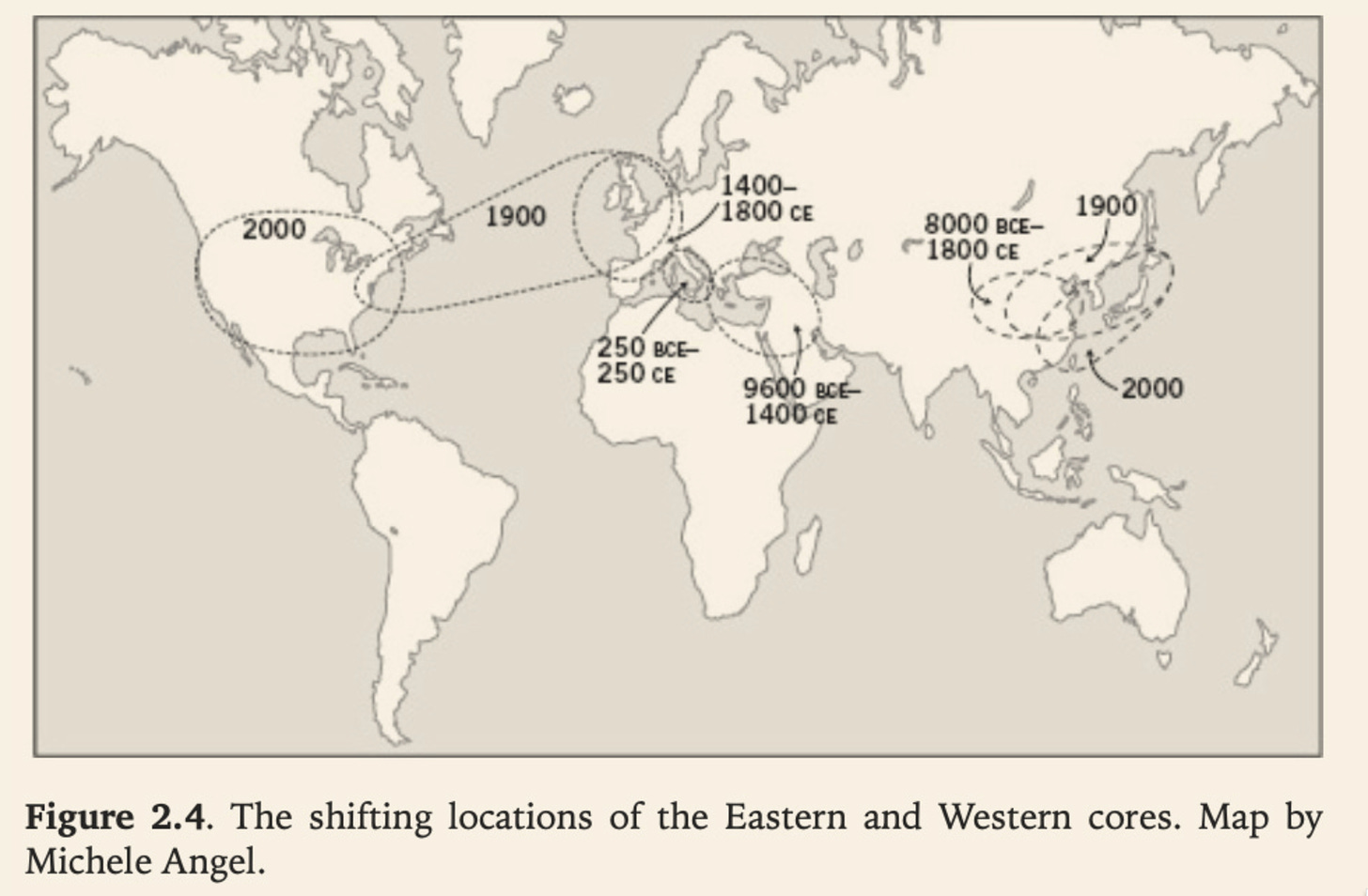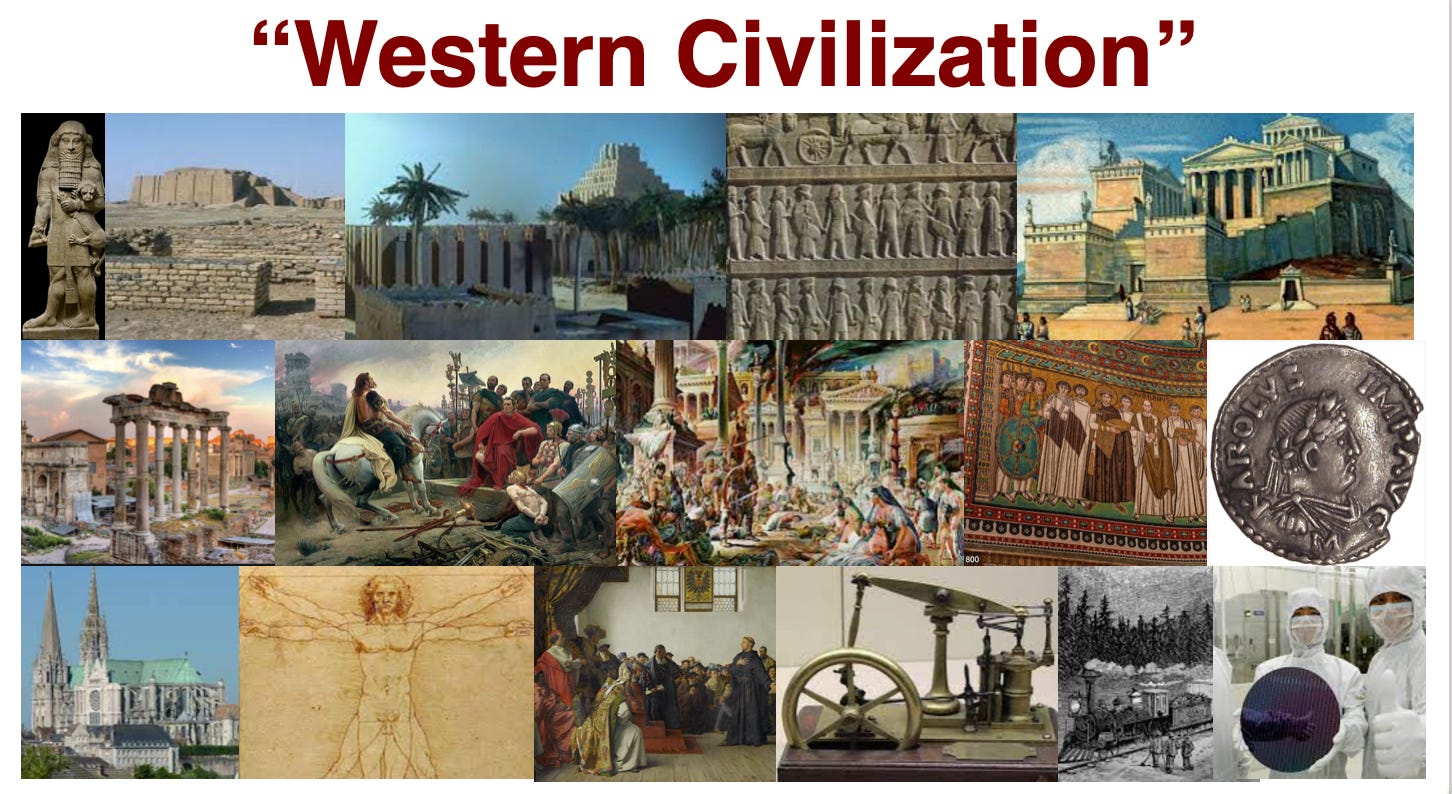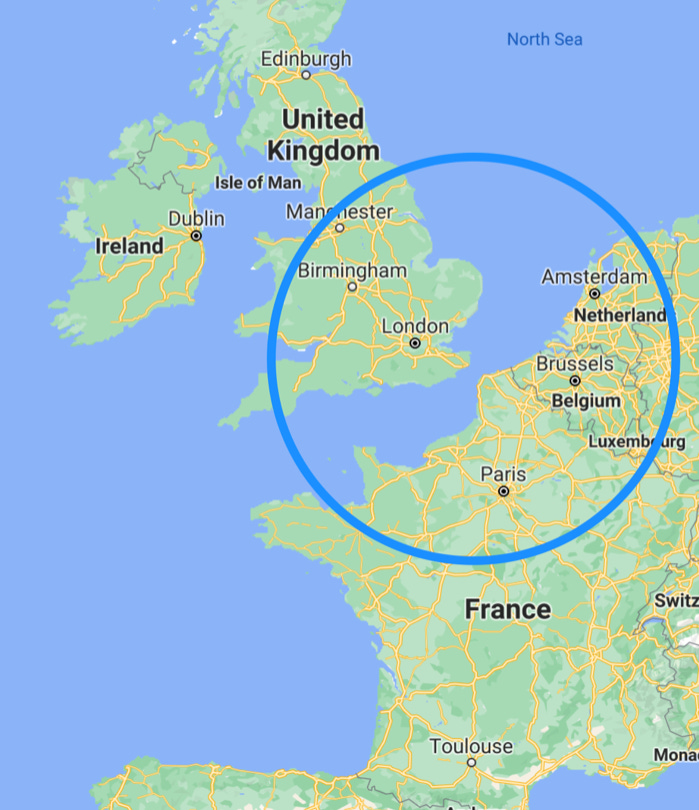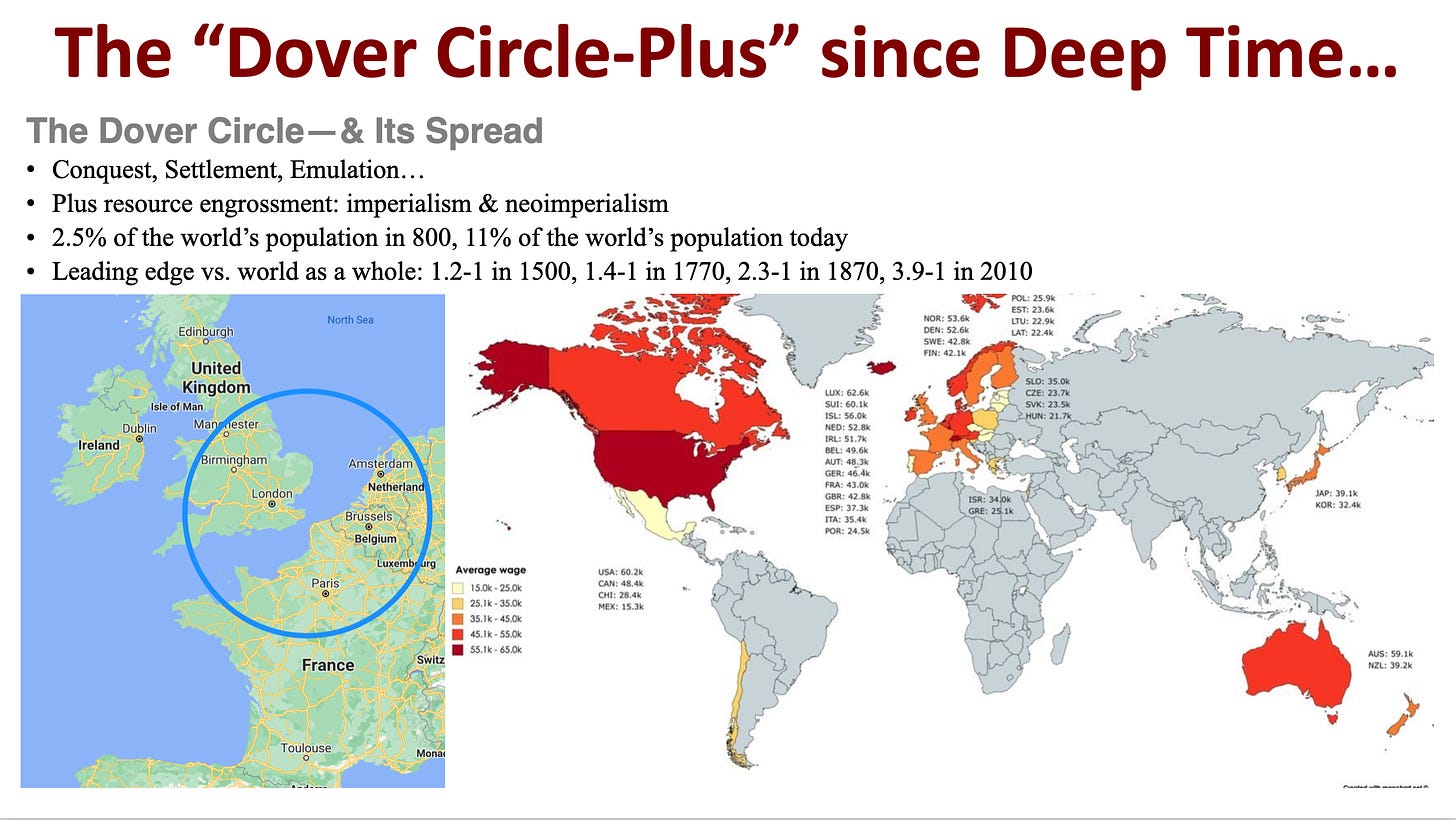“West”, “North Atlantic”, or “Dover Circle-Plus”?, & BRIEFLY NOTED: For 2023-01-21 Sa
“West” or “Dover Circle-Plus”? A student asked me why, in my lectures earlier this week, I kept on referring to the “North Atlantic” rather than the “Western” economies. Why did I use the first rat...
FOCUS: “West” or “Dover Circle-Plus”?
A student asked me why, in my lectures earlier this week, I kept on referring to the “North Atlantic” rather than the “Western” economies. Why did I use the first to refer to those that have become vastly richer than the world average over the past 200 years?
I was not aware that I had settled on “North Atlantic”, at least for last week. I find myself bouncing around when I am not focusing on what descriptor to use.
I do, however, try to avoid “West”. Part it is that “West” is out-of-date. “West” comes from a time and a place now long ago: a time and a place when it was assumed that pretty much everything of interest was in Eurasia, and that the most important thing was the contrast between the western edge of Eurasia and everything else that was east—that was the “Orient”, from the Latin word for the direction from which the sun rose.
But even then, “West” as in “Western edge of Eurasia” did not really cut it. As of the early 1800s, Portugal, Spain, Italy, and southern France were no longer securely among the relatively rich. The United States, and Canada too, were very rich indeed, and the United States’s population was growing rapidly. Even as of the early 1800s, “North Atlantic” made more sense than did “West”. And in the 2000s things have changed furtehr: Japan? South Korea? Australia and New Zealand? Hong Kong, Singapore, and Taiwan island? By 1960, “North Atlantic” itself became less apposite. Would “Global North” be a good replacement?
But “Global North” is not quite right either: New Zealand, Australia, Singapore, Hong Kong, and soon—we hope—Chile?
I am swinging around to think that a more useful and informative label would be “Dover Circle-Plus”: those economies and societies that are, that have received very large settler inflows from, or that have strained every nerve to emulate the particular economic structures and patterns and practices that developed in the years after 1500 in a 300-mile radius circle centered on the port of Dover at the southeast corner of England.
I would use "Dover Circle-Plus", if anyone would understand me.
But there is another reason to avoid much talk of the “West” and the “East”. Above is a map showing what Stanford’s Ian Morris <https://archive.org/details/whywestrulesforn00morr_1/mode/1up> thinks are the economic and civilizational "core areas" of “Western” and “Eastern” civilization since the year -9600.
For nearly all the time since the invention of agriculture, the Eastern core is the Yellow River and Yangtze Valleys, according to Morris. He sees it as, by 1900, moving a little further east: gaining Manchuria and Japan, while losing Sichuan and the upper Yellow River Valley. By 2000 the core has further gained Taiwan island and the Pearl River Delta, but lost has non-coastal China (including Manchuria).
There is continuity here: political continuity, cultural continuity, unbroken chains of influence, even substantial continuity of genetic descent.
This is in great contrast to the “Western core”. Morris claims that from -9600 to 1400 it extended from Basra on the Persian Gulf to Tbilisi in the Caucasus to Ithaka off the northwest corner of Greece to Thebes in Egypt. Then, from -250 to 250 it…moved? …had added on? … comprised Italy, Sicily, and Sardinia. Yet after 250 it reverted back to the original Basra-Tbilisi-Ithaka-Thebes quadrangle.
In 1400, however, that then pops like a bubble. For the period 1400 to 1800, according to Morris, the “Western core” picked up stakes and moved to Western Europe. And by 1900 the Western “core area” has extended a pseudopod across the Atlantic to the American northeast and contracted in Eurasia, where it is: Ireland and Britain, the Low Countries, northern and western France, and northwest Germany.
Come 2000, Morris’s “Western core” is the continental United States plus the more-settled parts of Canada.
Truly a moveable feast.
I feel a great lack of continuity here. What has the civilization of Uruk in -3000 have to do with the civilization of Silicon Valley today? In what sense are they both “the West”, save that there are some people at Stanford who read The Story of the Man Who Saw the Deep, the Epic of Gilgamesh <https://archive.org/details/gilgameshnewrend00ferr>?
Certainly there was a time in the 1800s when people wanted to tell the Story of Civilization as something like an Olympic-torch relay race:
The flint is struck and the torch lit in the Uruk of Gilgamesh and in Ur of the Chaldees.
It is then passed down to the Pharaohs of Egypt and to the Babylon of Hammurabi.
It winds up in Jerusalem, in the hands of Kings Dovid Melech Yisrawel and his son Salomo.
The torch is then passed—perhaps through Kurush and the other Loyal-Spirit Great Kings of the Persian Empire—to Athens!
And then on to Rome!
And conquering Rome is then conquered by Jerusalem and Galilee, as the torch is carried forward!
And so on. In the aftermath of the fall of Rome, barbarian invasions and western Christendom then meld themselves into European feudal civilization, which picks up the torch. The torch is handed off to the Renaissance. The Reformation, The Enlightenment rise of representative government and common-law systems: governments that exist to secure people’s natural rights and that derive their just powers from the consent of the governed. Then the British Industrial Revolution. And on to modern democratic capitalism, or capitalist democracy.
But this is like picking out pictures of things you like in a photograph and claiming that they are “yours”.
There was no single torch. There were no hand-offs. And if there had been a single torch, it would come with all kinds of things that we do not like at all.
Thus it does annoy me when people speak of cultural-civilizational patterns rooted in the early-modern imperial-commercial age Dover Circle and then the Dover-Circle-Plus as “the West” and talk of and unreflective believe in some “it” that is “Western Civilization”, which the people living in the Thames Valley of the island of Great Britain in the 1800s possessed as rightful heirs.
Earlier peoples ascribed the rôles of torch-bearers in this relay would have been very surprised to learn that the inhabitants of the Thames Valley were in any way them or their heirs. In the -50s, Roman Senator and Proconsul Marcus Tullius Cicero snidely snarked argued that the Britons had no silver and were too stupid and uneducated to make good slaves—hence they were not worth imperializing. Athens had very little tolerance for Jerusalem. And Jerusalem had even less tolerance for Athens.
If you want continuity starting at the Western edge of Eurasia of the same kind as you see in the “Eastern Core”—political, cultural, linked chains of influence, some continuity of genetic descent—you certainly cannot start before 800, and perhaps not before 1500. And you have to start in the Dover Circle.
But do not carry this tradition-demolition project too far. In 800 the Dover Circle a backwater, technologically behind—and hundreds of years technologically behind, much of the time—the world average. But around the year 800, in the Dover Circle, a local barbarian, a Frankish king, Charles, son of the usurper Pippin the Short, extended his military reach from his sometime capital city of Aachen or Aix-la-Chapelle in the Dover Circle to the Elbe River in Germany, the Tiber in Italy, the Ebro in Spain, and to the borders of Hungary. Pope Leo II then crowned “Charlemagne” Emperor, the first emperor dwelling west of Constantinople for three and a quarter centuries. And after that interesting things did begin to happen between Stockholm and Sevilla, ultimately concentrating in the Dover Circle.
But they did not happen rapidly. Even as of 1500 the Dover Circle held no place special in world civilization. Yes, the Dover Circle by 1500 was no longer a backwater. Yes, it had from 800 to 1500 had a rapid creative run of growth and technological advance for a pre-Imperial-Commercial civilization in the Middle Ages. But much of that was simply a Viking-raided backwater’s catching up to world civilization. In 1500 it certainly had no “edge” in governance or culture, and in technology whatever edge it had was narrow—ships and gunpowder and cannon, and perhaps precision machinery like, clocks.
Maybe it has a small technological edge on average in 1500. Perhaps 1.1 over the other high civilizations of Eurasia? It did forge ahead after 1500 in technology faster than the world average, but not that much faster.
It certainly developed a politically and militarily important technological edge in ocean navigation and gunpowder weaponry. Caravels begin to dominate the world’s oceans from 1500 on—although the first great exploratory-imperialist wave comes from Portugal and Greater Castile. But do not overstate that edge. The Ottoman Empire was still besieging Vienna in 1688. It was only in ships that it dominated up until 1800. And its ships did not dominate always: the Omani from Muscat threw the Portuguese out of East Africa, and then ruled the coasts of the Indian Ocean from Zanzibar.
Even in the late 1700s it was touch-and-go. The British started to conquer India, but they could not maintain their hold on North America. What had been a perhaps 1.1-1 edge in technological prowess in 1500 was only perhaps 1.4-1 in 1770.
Even in the 1800s the French failed in their conquest of Mexico and had a devil of a time conquering and colonizing Algeria.
Not until 1880 and the machine gun did it become the case that Dover Circle-Plus armies could march anywhere and conquer anything (save, for the Italians, Ethiopia; and save, for the British and the Russians, Afghanistan). And in the end the durable expansion of the Dovber Circle to the Dover Circle-Plus of today was as much a soft- as a hard-power process.
& þe “‘West’ vs ‘Dover Circle-Plus’ Video:
MUST-READ: Slouching Towards Utopia Makes the New Yorker:
It is nice to see it recognize the existence of my Slouching Towards Utopia book <bit.ly/3pP3Krk>. It is only a little squib, but still…:
New Yorker: Briefly Noted: ‘Slouching Towards Utopia, by J. Bradford DeLong (Basic). This economic history takes up the period from 1870 to 2010—what its author calls the “long twentieth century”—and examines why, despite the vast wealth generated during that time, problems such as climate change and inequality persist. DeLong, an economics professor, searches for explanations in the work of the period’s major political and economic theorists, such as Karl Polanyi and John Maynard Keynes, tracing their ideas’ intellectual and practical legacies. If our ancestors could see this era, he imagines, they might marvel at humanity’s “technological and organizational powers,” but they’d also wonder why we have “done so little to build a truly human world, to approach within sight of any of our utopias”…
Very Briefly Noted:
Gillian Tett: Four is the new two on inflation for many investors: ‘At Davos, a number of business leaders do not anticipate a return to the pre-2019 pattern of zero rates…
Paul Krugman: ‘Prices moderating everywhere; wage growth still elevated but moderating in 5 districts. Goes along with BLS, Atlanta Fed, Indeed etc. I was curious to see how the fire-and-brimstone inflation crowd would react to improving data. To my surprise and slight disappointment, many of them seem to be admitting that a soft landing is possible...
Franck Leroy: ‘14 years ago, Satoshi Nakamoto designed… the blockchain. Today, it weights 60 000 tons, wastes constantly 10 gigawatts (more than Belgium or Chile) to process less than 7 transactions per second: Less than a 33 bps modem from 1990…. A joke if it didn't have… environmental impact… ransomware…
Wikidpedia: You didn't build that…
Noah Smith: How college towns can survive and thrive over the next 20 years: ‘Two types of places with lots of educated workers have tended to thrive in the U.S… “superstar”… and college towns…. This was a local development solution that could really scale. There are only a handful of big superstar metros in existence, but America has a surprisingly large number of colleges — 2,832 four-year institutions, to be exact, scattered very evenly throughout the populated regions of the country…. I still believe college towns are well-positioned to thrive in the 2020s and 2030s, but… small cities are going to have to think carefully…
Rebecca Eliott: What if Tesla Is…Just a Car Company: ‘Tesla came up short of its growth target for 2022. Annual growth in vehicles delivered to customers slowed to 40%, from 87% in 2021.… Tesla’s stumble buys time for its emerging EV rivals…
Greg Robb: Fed must keep raising rates until it is certain inflation has stopped climbing, Kashkari says: ‘The terminal rate remains an 'open question,' Minneapolis Fed president says…
Sarah Constantin: Kelly Criterion: ‘A risk-neutral agent with respect to long-term gains becomes a risk-averse agent with respect to local wins and losses [if you must stop betting when your bankroll runs out]...
Bob Kuttner: Turning the Debt Ceiling Crisis Against McCarthy’s Republicans: ‘Biden needs to play serious hardball, or he will get rolled...
C.P. Snow (1964): The two cultures…
Tim Walters: Is Facebook “radically” evil? - TCA: ‘Remember that contract you signed with Facebook… entering into an agreement to surrender so much of your personal data (and perhaps that of your networked friends) in exchange for… targeted advertising?… According to Katharina Raabe-Stuppnig… “Facebook now says that they do not need consent for the use of the data because users ordered this advertising. Advertising on Facebook is now supposed to be an important part of the ‘service promise.’ It’s as if [Facebook thinks] users join Facebook only to see ads”…
Hyunjoo Jin: Tesla video promoting self-driving was staged, engineer testifies: ‘The video, which remains archived on Tesla’s website, was released in October 2016 and promoted on Twitter by Chief Executive Elon Musk as evidence that “Tesla drives itself.” But the Model X was not driving itself with technology Tesla had deployed...
George F. Kennan (1947): The Sources of Soviet Conduct…
Michael Kremer: The O-Ring Theory of Economic Development: ‘<https://www.jstor.org/stable/2118400>…
Marty Weitzman: A Unified Bayesian Theory of Equity ‘Puzzles’: ‘Proper Bayesian estimation of uncer- tain structural growth parameters adds an irreducible fat-tailed background layer of uncertainty…. The Bayesian statistical-economic equilibrium has just one degree of freedom, yet the data generating process of the model matches simultaneously all three empirically-observed values of the equity premium, risk-free rate, and excess volatility…
Sarah Constantin: Is Human Intelligence Simple?: Evolution and Archaeology Genetics Disambiguating Types of Simplicity…
Wikipedia: Michael Postan…
Wikipedia: Fortran…
Tyler Cowen: US Industrial Policy: ‘If someone says, “Well, there's a crisis in semiconductors,” or, “Doing things to help universities is far too indirect,” I strongly suspect that's true. I don't know exactly how to fix that problem…. I'm pretty convinced we shouldn't be doing nothing. I would just say it's more useful to talk about specifics. Industrial policy per se doesn't really mean anything to me…
¶s:
Brian Potter: The Rise of Steel Part II: Bessemer: ‘The 1850s… Henry Bessemer… hypothesized that if a large enough surface of molten pig iron could be exposed to air, it would quickly be turned into wrought iron… blowing air through the iron…. Exothermic reactions… [removed] impurities… required no fuel input… could be cast into large elements…. Two problems vexed Bessemer. First, the air blast left oxygen dissolved in the metal. This was solved by Robert Mushet, who added "spiegeleisen," a cast iron with a high manganese content, to the liquid iron after the air blow was completed…. The second problem was the phosphorus content of the iron ore… wouldn’t be solved until 1877 with the development of the Thomas-Gilchrist process, which substituted a dolomite lining for the sand lining in the converter. The basic dolomite lining would react with the acidic phosphorus oxide in the liquid iron, producing slag that could be removed…
Matt Yglesias: Never answer mailbag questions angry!: ‘[That] people who want to criticize me tend to bring up the same small number of takes, often ones that are years old and usually ones that are on subjects that are outside my normal range of coverage, tells you something—especially because my usual range of coverage is itself pretty large. People are not saying “wow, Matt really blundered when over a decade ago he made the economic costs of land use regulation a major theme in his work.” They’re not saying my advocacy for more stimulative macroeconomic policy in Obama’s second term aged poorly. When I wrote “Swing Voters are Extremely Real” in the summer of 2018, it was an unfashionable and mildly contrarian point, but I don’t think people seriously dispute it today…. I don’t think enough attention is paid to sins of omission, and I almost never hear anyone own up to having committed any of them…. Nobody is required to weigh in on every controversy that passes through the world. But… I’ve never seen someone say “you know what, I was too reluctant to engage in this hot-button policy controversy.”… If I were writing a profile of myself, that would be my key thesis…. Journalists… should be less afraid of “cancellation.” I’m… critical of “cancel culture.”… I’ve also become uncomfortable with the extent to which cancel culture critics tend to tell exaggerated scare stories of the threat of cancellation…. I have a good life and a successful career and more people should be more outspoken about things they believe in and have more confidence in their ability to succeed that way…
Tim Harford: Is life in the UK really as bad as the numbers suggest? Yes, it is: ‘The past 15 years have been a disappointment on a scale we could hardly have imagined.... Real household disposable income per capita has barely increased for 15 years. This is not normal…. Had the pre-crisis trend continued, the typical Brit would by now be 40 per cent richer. Instead, no progress has been made at all…. The past 15 years have been a disappointment on a scale that previous generations of British economists could hardly have imagined…. In normal circumstances, we can’t have it all. Right now, we can’t have any of it…
Martin Wolf: Davos: There’s life in global capitalism yet: ‘Rumours of the demise of international business and trade have been exaggerated…. Ultimately, capitalism is global, because opportunities are global…. Yet whether they are exploited, and by whom, is also determined by the risks and the constraints. What has changed are perceptions of risk…. Perceptions have, in sum, shifted towards “dog eats dog” from “dog trusts dog”. How far has this shift gone in practice? “Not so far” is the answer…
Sarah Constantin: Why Infinite Coin-Flipping is Bad: ‘It makes sense to ask whether a reckless investor’s beliefs about risk led him to take lots of risk…and here it seems undeniable. FTX totally practiced what SBF preached…. Above-Kelly betting can only be optimal if you are willing to accept facially absurd conclusions like “I will almost surely go completely broke, but it’s okay, because I’ll win big if I keep getting lucky forever, even though the long-run probability of that is literally zero”…










I think the ideas of "cores" is far too reductive and obfuscates more than it illuminates, and is ridiculously Anglocentric. It completely misses major civilizations like the Islamic empires, the Indus valley, the American Mayans and Aztecs, and the African empires. The circles in 1800 and 1900 are also far too small, as they exclude Italy and Germany - Germany was the most scientifically advanced country in the world in 1900 and Italy produced Galileo, Volta, Avogadro and LaGrange among many others. So I'm not sure how useful the idea of "cores" are, and they're too subjective and ill-defined to build an argument on.
[if you must stop betting when your bankroll runs out]
You do not need to consider debt, or even the possibility of bankruptcy, to make Constantin's math work. Think of a geometric Brownian motion with mu < sigma^2 / 2, sigma > 0. The game will never end, you'll just spend eternity with wealth arbitrarily close to zero.